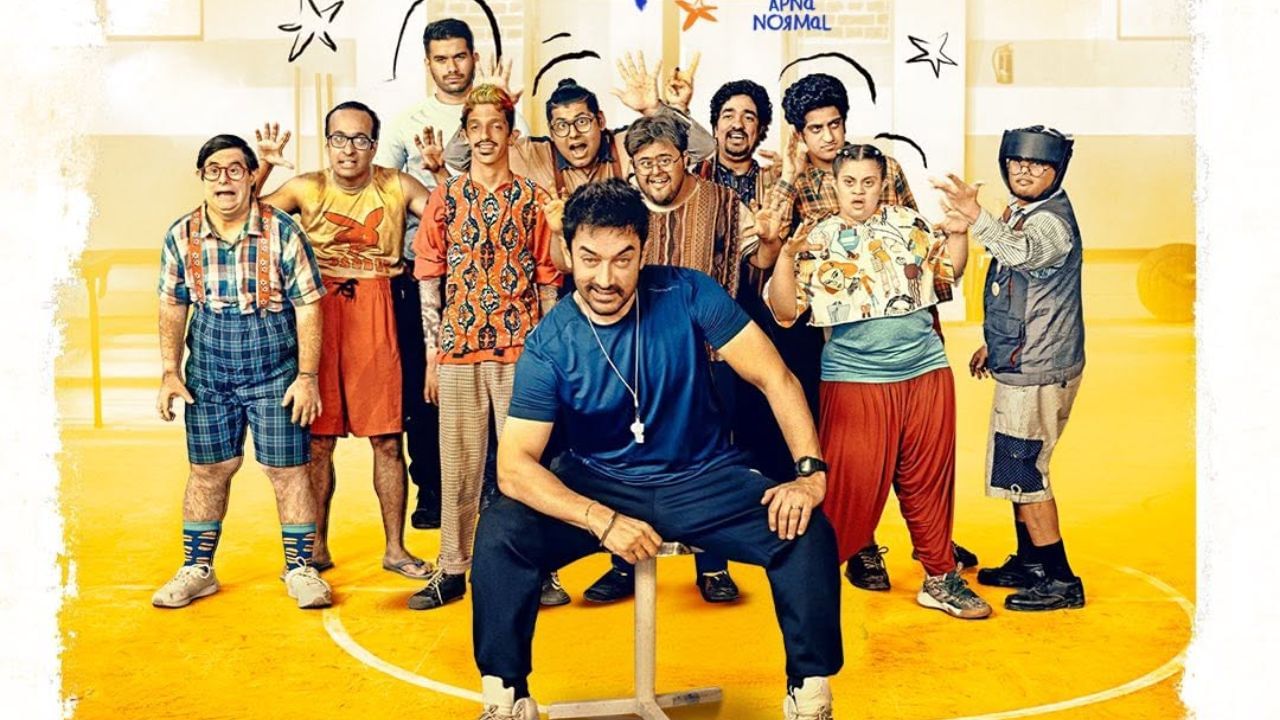New Delhi: When Taare Zameen Par hit the screens back in 2007, it didn’t just hit home but it banged the doors. It made us cry, made us laugh, made us feel all sorts of emotions. It was a certainly a game-changer in the Hindi entertainment industry and is considered one of the bests from Aamir Khan. Aamir, in his director-actor role, managed to strike that rare balance between entertainment and impact. Now, almost after two decades, he’s back with Sitaare Zameen Par, a film that sounds like Taare, was initially misunderstood as a sequel, but is a very different story that keeps Taare Zameen Par’s soul intact. It that earlier triumph but walks its own slightly less emotional path.
This time, the spotlight shifts from schoolkids and dyslexia to a group of neurodivergent adults who find themselves on a basketball court with a coach who’s not very thrilled with the idea of being with them. Adapted from the Spanish film Campeones, Sitaare Zameen Par stays fairly real to the original plot, but with an Indian masaledar twist. The humour, the emotional beats, and even the stereotypes are woven creatively to suit our desi hunger. Now while the film is sincere in its efforts, it doesn’t quite grab you by the soul the way its predecessor did.
At the centre of it all is Gulshan Arora, coach’s character, being played by Aamir, a short-tempered, narcissist junior basketball coach who lands in trouble for driving under the influence. As a punishment, he gets the community service (rare in Indian society of course). He now has to be the coach of a team of intellectually challenged adults. You can guess how he reacts. There’s skepticism, discomfort, and a bit of awkwardness. But as the story moves forward, so does Gulshan’s character, from being a man who can’t connect to anyone outside his comfort zone to someone who finds family in the most unexpected places.
The team he coaches is a beautiful & fresh mix of personalities- Sunil, Satbir, Lotus, Sharma Ji, Guddu, Raju, Bantu, Golu, Kareem, and Hargovind, each with their own quirks, style & charm. These characters aren’t just the background noise or comic relief in this film but they’re the heartbeat of the film, given proper amount of screentime & importance. What’s more interesting is that the actors portraying them bring a natural, unfiltered energy to the screen, making it hard not to cherish them.
Aamir or Mr Perfectionist, as always, brings the watchability to his performance. He plays Gulshan as a man many of us have probably met, a person who’s technically good at his job but lacks emotional depth. Watching him slowly (and sometimes stubbornly) evolve is where the film finds its most meaningful moments. Genelia Deshmukh lends a “touch grass” reality to the plot, while Dolly Ahluwalia steals a few scenes as Gulshan’s no-rubbish mother who just wants her son to look beyond himself for once. The taunts that Gulshan gets from his mother in the film, are the ones we’ve heard from our mother every now and then.
The film also deserves credit for how it navigates the Indian social demographic, especially the way neurodivergence is viewed through the lens of discomfort, hesitation, shame, misunderstanding, or mostly pity. One of the most moving moments comes when Gulshan starts to realise that this team isn’t ‘broken’ and that “Sabka Apna Apna Normal Hota Hai”. They’re not here for anyone’s sympathy. They’re just different, and happy in ways he’s never allowed himself to be. Some moments become a gentle yet powerful reminder that empathy doesn’t require a master degree but just an accepting & open heart.
Now, let’s talk about the not-so-great bits. The first half? As slow as a turle. It takes its time setting things up, and you might find yourself wondering if the film plans to shift the pace at all. Luckily, the second half picks up once the emotional stakes get higher and the team starts feeling like ‘a team’.
Also, while the performances are spotless across the board, the emotional resonance feels a bit calculated. Unlike Taare Zameen Par, which had raw, untouched, original energy, this one leans a bit too heavily on the structure of Campeones. You can see the beats coming from a mile away, which makes the emotional impact feel a little muted and mostly predictable.
But despite the flaws, there’s something undeniably catchy about Sitaare Zameen Par. It doesn’t shout the message, it gently sends it across. It celebrates lives that are often left unnoticed and gives them space to shine without making them the object of pity. And honestly, that’s the Indian Cinema we used to celebrate.
So, should you watch it? Yes, just maybe not with the same expectations you had with Taare Zameen Par. It might not bring you to tears, but it’ll likely bring a soft smile. The story may be familiar, and the emotional beats might not land with thunderous impact, but there’s honesty in its heart and sincerity in its soul.
And hey, it reminds us all of something important: empathy isn’t just an emotion, it’s a skill.
